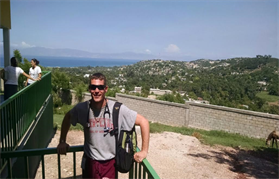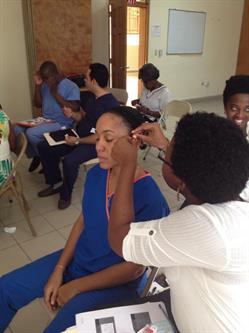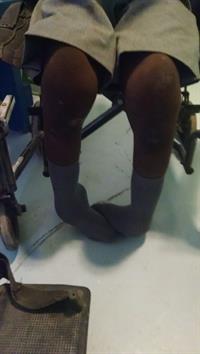Healing Hands for Haiti—Lessons from International Volunteer Experience in Rehabilitative Medicine
William W. Ide, MD
PGY-2, University of Virginia
 I have always had an interest in international medical service work, though in the past I envisioned volunteer opportunities abroad as the realm of the infectious disease specialist or the emergency physician, until I discovered Healing Hands for Haiti (HHH). HHH is a non-profit, non-governmental organization, founded by AAPM&R member Jeffrey G. Randle, MD, that provides physical medicine and rehabilitation care, training, and education for adults and children with physical disabilities in Port Au Prince (PAP), Haiti. Roughly 800,000 Haitians were living with disabilities prior to the earthquake of 2010,1 which alone resulted in an estimated 2,000-4,000 people undergoing amputations.2
I have always had an interest in international medical service work, though in the past I envisioned volunteer opportunities abroad as the realm of the infectious disease specialist or the emergency physician, until I discovered Healing Hands for Haiti (HHH). HHH is a non-profit, non-governmental organization, founded by AAPM&R member Jeffrey G. Randle, MD, that provides physical medicine and rehabilitation care, training, and education for adults and children with physical disabilities in Port Au Prince (PAP), Haiti. Roughly 800,000 Haitians were living with disabilities prior to the earthquake of 2010,1 which alone resulted in an estimated 2,000-4,000 people undergoing amputations.2
 Although I was not yet a trained physiatrist, I was pleased to learn that I could still contribute to Healing Hands as an experienced military generalist with additional expertise in medical acupuncture. In October 2015, I joined a group of speech, occupational, and physical therapists in Miami en route to PAP. We were fortunate to have an outstanding team leader who had been making annual volunteer trips to Haiti for several years. The months preceding our trip were spent gathering donated supplies ranging from simple hygiene items to assistive devices for ambulation. I would soon learn that footwear would be in high demand and my experience in Afghanistan had been a lesson that you can never bring too many stuffed animals to give to kids.
Although I was not yet a trained physiatrist, I was pleased to learn that I could still contribute to Healing Hands as an experienced military generalist with additional expertise in medical acupuncture. In October 2015, I joined a group of speech, occupational, and physical therapists in Miami en route to PAP. We were fortunate to have an outstanding team leader who had been making annual volunteer trips to Haiti for several years. The months preceding our trip were spent gathering donated supplies ranging from simple hygiene items to assistive devices for ambulation. I would soon learn that footwear would be in high demand and my experience in Afghanistan had been a lesson that you can never bring too many stuffed animals to give to kids.
HHH’s rehabilitation center, Kay Kapab Klinik, is an impressive 3-story facility that is fully accessible by ramps. Although electricity is a fickle commodity in Haiti, the clinic’s generators provided a reliable power supply for the prosthetic and orthotic shop and therapy rooms. Healing Hands employs roughly 40 Haitian staff including outstanding physical and occupational therapists, prosthetists, technicians, custodial, and administrative personnel. While there is no full-time physiatrist on staff, physician services were provided by a local volunteer family practitioner 2-3 days per week. Prior to my arrival, the therapy staff identified candidates for acupuncture referral. I treated a number of patients for axial neck and lower back pain resulting from a lifetime of manual labor. A few patients had been able to obtain plain radiographs of their spines and brought them along for my review, all of which were significant for degenerative spondylosis to a degree of severity rarely encountered in my practice in the United States.
 Our team had the opportunity to travel to outreach clinics in more remote locations surrounding PAP where we evaluated and treated children with disabilities, many of whom were orphans. Cerebral palsy was common and the majority of the affected children had developed contractures as a result of inadequate or non-existent spasticity management. Utilizing a heat-gun, our therapists were able to mold donated orthotics and a few of the children were able to walk for the first time using standing-frames we constructed out of PVC pipes. In this capacity, I truly came to appreciate the value of a cohesive interdisciplinary rehabilitation team and we all learned something from one another.
Our team had the opportunity to travel to outreach clinics in more remote locations surrounding PAP where we evaluated and treated children with disabilities, many of whom were orphans. Cerebral palsy was common and the majority of the affected children had developed contractures as a result of inadequate or non-existent spasticity management. Utilizing a heat-gun, our therapists were able to mold donated orthotics and a few of the children were able to walk for the first time using standing-frames we constructed out of PVC pipes. In this capacity, I truly came to appreciate the value of a cohesive interdisciplinary rehabilitation team and we all learned something from one another.
Rehabilitation in the developing world is exceptionally rewarding and worthwhile. I will never forget the strength and resolve of the Haitian people and I am looking forward to returning with a broader PM&R skillset. While the direct patient care efforts of the short-term volunteer may be limited in scope, a lasting impact can still be achieved through training and education of local providers.
1 Haiti Emergency SITUATION UPDATE NOVEMBER 2014. Rep. Handicap International, n.d. Web. 29 Feb. 2016. https://d3n8a8pro7vhmx.cloudfront.net/handicapinternational/pages/1520/attachments/original/1420749951/Haiti_Fifth_Anniversary.pdf?1420749951.
2 Overcoming Adversity: Haitians Deal with Disabilities. Rep. World Health Organization, n.d. Web. 23 Feb. 2016. http://www.who.int/hac/crises/hti/blog/mari_agnes/en/.